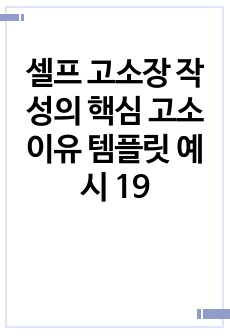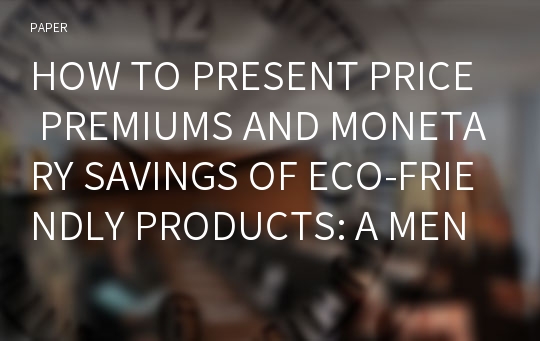HOW TO PRESENT PRICE PREMIUMS AND MONETARY SAVINGS OF ECO-FRIENDLY PRODUCTS: A MENTAL ACCOUNTING THEORY PERSPECTIVE
* 본 문서는 배포용으로 복사 및 편집이 불가합니다.
서지정보
ㆍ발행기관 : 글로벌지식마케팅경영학회(GFMC)
ㆍ수록지정보 : Global Marketing Conference
ㆍ저자명 : Junyong Kim, Jungyun Jeong
ㆍ저자명 : Junyong Kim, Jungyun Jeong
영어 초록
As the general public’s awareness of the environmental problems associated with economic growth have increased, interests in eco-friendly products have also increased for the past few decades. However, many consumer surveys and sales data indicate that while many consumers believe that buying eco-friendly products is important for protection of environment, actual adoption of those products are far below what has been expected. This discrepancy between consumers’ beliefs and actions regarding eco-friendly products purchase suggests that consumers do not purchase eco-friendly products solely based on environmental concerns and environmental merits of products.Then, what is the decisive determinants of consumer’s decisions to buy of green products? Previous researches showed that many people usually are reluctant to buying green products because of high price compared to conventional products (Hopkins and Roche 2009; Thakur and Aurora 2015), but if people perceived additional value to self (e.g. functional value, social value, emotional value, economic value, epistemic value), people are willing to buy green product (Lin and Huang 2012; Jung and Kim 2014; Renfro 2010). In other words, the perceived personal value for money, associated price and benefits of product, can be importantly decisive determinants of eco-friendly buying decisions. Moreover, among many values or benefits, economic benefit such as monetary savings can be an effective factor to adaption of green product. This is because that many consumers are very sensitive to price of green products as many researchers argued, and economic benefit is so visible and computable that reduce consumer’s perceived cost.
Therefore, for inducing the adaption of green product, the way of appealing and presenting product information about price premium and potential economic benefits is very important in marketing communication with consumers. However, the extant many researches have focused on highlighting that which benefits of product depending on individual difference is more attractive to people, rather than both price and benefit. There is a general lack of study on this issue in the extant literature.
Furthermore, previous experiments about green products have another limitation that it is difficult to reflect the real choice of green product. Many empirical researches have focused on an attitude toward product or advertisement, a preference or a purchase intention as dependent variables, which are mostly used for predicting consumer’s choice of product. However, choice does not always and reflect the attitude toward product or
advertisement, preference or purchase intention. Thus, the more research reflected actual
choice of green product or conventional product is considerably needed.
To fill the gap in the extant literature, this research develops and tests hypotheses on how
different presentations of price premiums and monetary savings of eco-friendly products
affect consumers’ choice of those product, based on extended Thaler (1985)’s Hedonic
editing hypothesis of mental accounting theory, which this study proposed. In extended
Thaler’s Hedonic editing hypothesis, alternative presentation (all of segregation) is added
to original Thaler’s Hedonic editing hypothesis, to compensate for limitation of original
hypothesis that most fragmentarily consider two attributes of product (e.g. one gain and
one loss, one gain and one gain), even though attributes of products can be composed of
several attributes. Therefore, this research investigates whether presenting price
premiums and monetary savings in an integrated manner, a segregated manner or an all of
segregated manner leads to differential choices, depending on the relative sizes of
monetary gains and losses of various eco-friendly products. Additionally, this study also
analyze the moderating effect of consumer’s product involvement. According to ELM
model (Petty and Cacioppo 1979), the different methods of inducing persuasion may
work in decision-making process, depending on level of involvement. To be specific,
under high involvement, conditions the quality of the arguments contained in a message
has had a greater impact on persuasion (central route). While, under low involvement
conditions, peripheral cues such as attractiveness of a message source or the number of
positive or negative messages have had a greater impact on persuasion (peripheral route).
Therefore, this study suggests that consumers with low product involvement will more
choose green product in message condition, which has the greatest number of positive
information, while the consumers with low product involvement will have no difference
in choice of green product, depending on different presentation.
This study conducted an experiment about a choice between green product and non-green
product on different presentation of monetary costs and benefits (integration, segregation,
all of segregation), in each types of product (multiple gain product, mixed gain product,
mixed loss product). We selected representative product for each type of product, after
investigating market research (multiple gain product-washing machine; mixed gain
product-LED bulb and rechargeable battery; mixed loss product-hybrid car) as shown in
Table 1, and the price of each green and conventional product and cost saving amount of
green product is based on real product’s attributes, in an experiment. In doing so, this
study analyzed and compared the proportion of choice of green product in each
conditions, by using omnibus chi-square test with SPSS 21.0 (Sharpe 2015).
The findings of the empirical study shows that the effect of presentations of price and
monetary savings is only significant to low product involvement consumer in all product
categories, excepted for hybrid car. The results showed that low involvement consumers
make many choices of green product in condition, which has the greatest number of
positive information. Specifically all of segregation is the most persuasive than other
presentation for LED bulb to low involvement consumer, but all of segregation is the less
persuasive for rechargeable battery. This results indicate that the persuasive way of presentation is different depending on attributes of each product although LED bulb and rechargeable battery is classified as same types of product.
The contribution of this study to the literature on choice of eco-friendly products in perspectives of mental accounting theory is four-fold. First of theoretical contribution, this study could extend and develop Thaler (1985)’s Hedonic editing hypothesis, by proposing alternative presentation (all of segregation). Additionally this study found that the proportion of choice of green product can be different in same type of product, depending on attribute of product. Third, this study reflected actual choice of green product by considering consumer’s choice as dependent variables, rather than attitude, preference or purchase intention. Finally, in managerial implication, this study provide managerial guidelines and strategy how to present the message about green product to increase consumer’s choice, depending on product type.
Further research for extend and develop this study are currently underway.
참고 자료
없음"Global Marketing Conference"의 다른 논문
 THE ROLES OF GREEN PACKAGING IN UGLY FOOD PURCHASE INTE..22페이지
THE ROLES OF GREEN PACKAGING IN UGLY FOOD PURCHASE INTE..22페이지 THE IMPACT OF INDUCED AWE ON ETHICAL TOURIST BEHAVIORS5페이지
THE IMPACT OF INDUCED AWE ON ETHICAL TOURIST BEHAVIORS5페이지 A BIBLIOMETRIC ANALYSIS OF SPIRITUAL TOURISM RESEARCH15페이지
A BIBLIOMETRIC ANALYSIS OF SPIRITUAL TOURISM RESEARCH15페이지 SOCIAL NETWORK ANALYSIS AND RESPONSE TIME TESTING: CONS..11페이지
SOCIAL NETWORK ANALYSIS AND RESPONSE TIME TESTING: CONS..11페이지 THE EFFECTS OF PARA-SOCIAL INTERACTION ON ONLINE CELEBR..3페이지
THE EFFECTS OF PARA-SOCIAL INTERACTION ON ONLINE CELEBR..3페이지 THE INFLUENCE OF OPINION LEADERS ON DAILY DEALS USER’S ..3페이지
THE INFLUENCE OF OPINION LEADERS ON DAILY DEALS USER’S ..3페이지 HOW IMMERSIVE RETAILING AFFECTS CONSUMERS’ URGE TO BUY:..6페이지
HOW IMMERSIVE RETAILING AFFECTS CONSUMERS’ URGE TO BUY:..6페이지 KEY TO SUPERSTARDOM IN A GLOBALISED MARKET: THE ROLE OF..6페이지
KEY TO SUPERSTARDOM IN A GLOBALISED MARKET: THE ROLE OF..6페이지 A POST-PANDEMIC LOOK AT TOURISTS’ PERCEIVED COOLNESS OF..4페이지
A POST-PANDEMIC LOOK AT TOURISTS’ PERCEIVED COOLNESS OF..4페이지 EXTRACTING OFFLINE RETAIL SHOPPING PATTERNS: OLLABORATI..5페이지
EXTRACTING OFFLINE RETAIL SHOPPING PATTERNS: OLLABORATI..5페이지

























